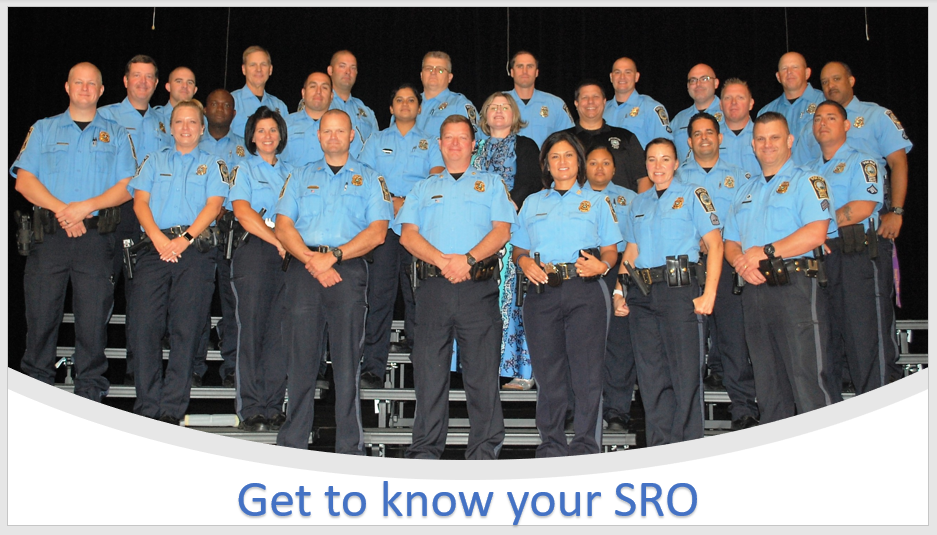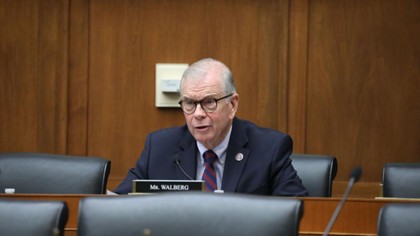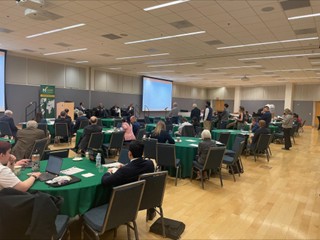The History and Purpose of School Resource Officers in PWC
Editor’s Note: This article has been updated to include a recent statement
Since late spring, when the video of George Floyd suffocating to death due to a knee hold by a Minneapolis police officer made national headlines, the institution of American policing has come into question. Although there seems to be bi-partisan agreement about the injustice of Floyd’s death, there is not agreement about what changes to the institution of policing should follow it. Right-wing Republicans responded to ‘Black Lives Matter’ Movement protests with ‘Back the Blue’ counter-protests. A few of such protests have taken place in Prince William County. The reactionary response posits the conflict as the public versus the police. Whereas others consider it to be a matter of justice versus injustice.
Part of the ongoing conversation on police has been the presence of law enforcement in public schools, most commonly referred to as School Resource Officers (SROs). The practice of putting police in public schools became widespread as a response to the school shootings of the 1990s, according to research.
Lieutenant S.B. Ash, commander of SRO program in Prince William County, provided information that “The Juvenile Bureau started in late 1970 to investigate all crimes against children. In 1974 a federal grant enabled us to start the Community Resource Officer Program.” At the time they were “called Community Resource Officers or CROs.” According to Lieutenant Ash “They were called CROs instead of SROs because it was a community policing grant and someone thought we wouldn’t have as good a chance of getting one if we didn’t have “community” in the name. The CRO’s also taught the County’s D.A.R.E program to the students.” He recalls that “the CRO’s changed the name to SRO in the mid-90’s.”
He also stated that “At that time [mid-1990s] we [PWC police] had one CRO assigned to Gar-Field, Woodbridge and Stonewall Jackson high schools. As high schools were added they each (except Brentsville High for quite a while) had an assigned CRO but each CRO was also responsible for all the elementary and middle feeder schools to that high school.”
Additionally “CROs did not wear [police] uniforms during school hours, only [at school] dances, basketball and football games. Recalling that “We [CROs] were to dress like school administrators during the day.” And that “In those days we weren’t issued portable radios, collapsible batons, pepper spray or tasers. We had handcuffs, wheel guns (revolvers), hands on, and mostly our gift of verbal judo to rely on. We had assigned marked cars (part of the grant) that were take home if we lived in the county or out of the county with supervisor approval if having to work late and be back in early.”
“The primary function for SRO’s is the safety of the students and staff. They investigate criminal matters and do not get involved in disciplinary issues. The SRO’s wear many hats ranging from counselor, mentor and sometimes coach. We have several SRO’s that are currently coaches of various sports in the schools they work” says Lieutenant Ash.
Prince William County Schools does not currently provide data on the number of criminal offenses that occur in its schools. There is no data on the number of times SROs intervened in order to prevent or apprehend a crime at any given Prince William County school.
A few weeks back, on August 4th, I spoke with Acting Chief Jared Phelps about the Citizen’s Advisory Board. During our conversation he mentioned that “we [PWC police] had a couple of miffs that people came to the [CAB] table [with] and we were able to talk about those miffs. One of those being the SRO program and how it’s run. We went into decent detail as far as how the SRO program is administered in the schools. . .and what the SROs actually do in the schools.”
Lieutenant Ash provided PW Perspective with the PowerPoint used for the March 15th, 2018 Citizen Advisory Board (CAB) meeting. Below are three slides from it which were used to describe and explain the role and responsibilities of a School Resource Officer to advisory board members.
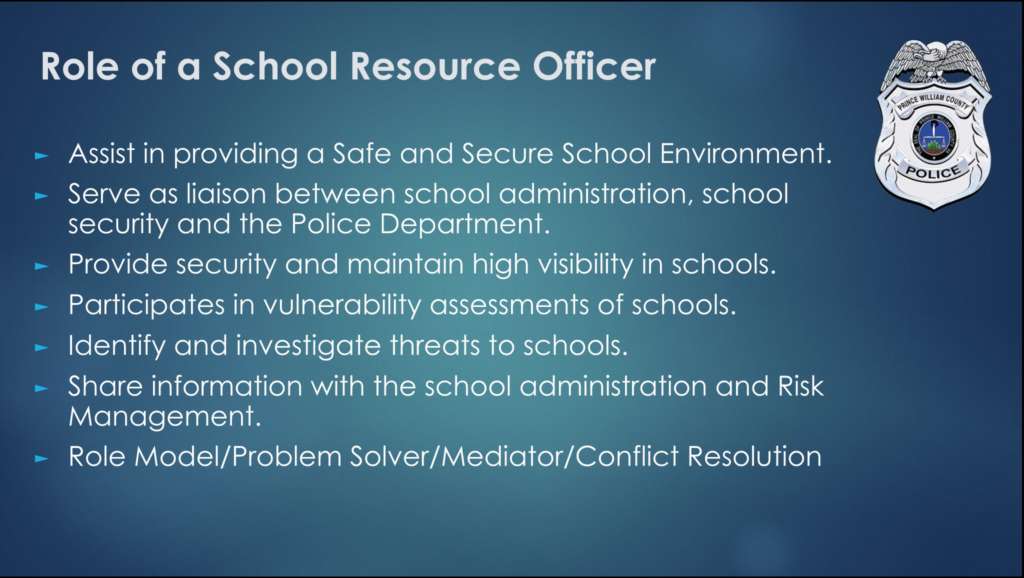
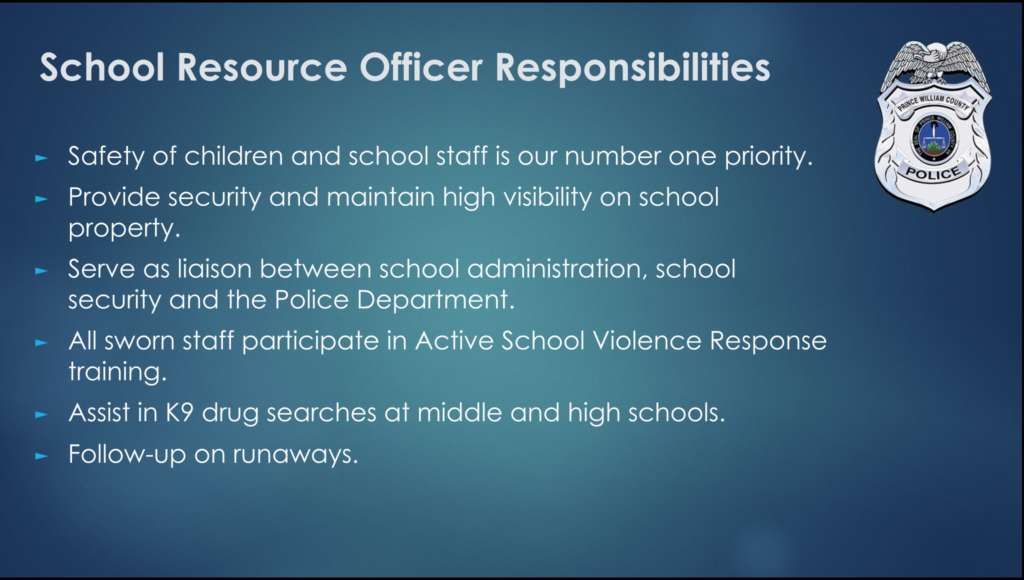
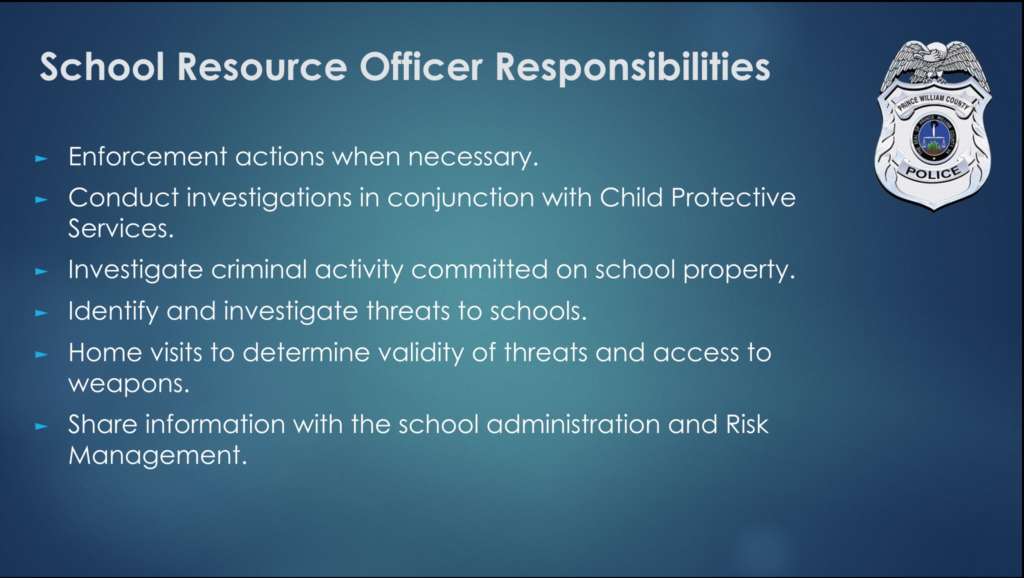
County government says “The SROs mentor County youth during the school day and well beyond it by coaching at their respective schools, working with various student groups after school, and attending evening functions.” And that “If a student is having problems at home, in the community, or in the school building, SROs are there to listen, to provide information on helpful County resources, and to be a fair and impartial advocate for doing the right thing for everyone involved. Their law enforcement mission – carried out through mentoring, counseling, and investigation, if needed – is to ensure the safest possible environment for everyone in the school building.”
All SROs are paid by the Police Department. Coaches for school sports team are hired under specific and separate job titles. Those who already work in the county, for example current teachers or SROs, may apply and take on a coaching position as an additional and separate duty with its own pay added to an employee’s original salary.
Virginia’s Department of Education requires specific educational program completion as well as a additional training in order to gain ‘initial licensure or renewal of a license with an endorsement as a school counselor,’ which SROs do not meet. Such counseling professionals adhere to the K-12 counseling program. As of 2019 PWC elementary schools had 1 counselor for every 500 students, middle schools had 1 counselor for every 400 students, and an average of 1 counselor for every 350 students in high schools. This is well above the American School Counselor Associations (ASCA) recommended 1 counselor for every 250 students, across all grade levels, ratio. The PWC School Board FY2019 noted that psychologists, social workers, substance abuse counselors, and other psychological services in schools were areas of critical need.
Captain E.J. Barnhart, the Director of The Criminal Justice Academy which “is responsible for all basic, in-service and leadership criminal-justice training for the Prince William County Police Department and the Prince William County Sheriff’s Office” according to county government, spoke to me about PWCPD trainings. “Pretty much any speciality assignment we have specialized training [for it] and they also go through refresher training.” And “The entire [police] department goes through refresher training regarding mental health.”
Training for SROs “deals with effectively communicating so that they [SROs] can have [positive] interactions with the students as well as the staff and be able to properly and effectively communicate with them.” Additionally SROs “get training in active violence in the event that there is an active shooter event at a school.” SROs also “do some other training along the lines of what their assignment is as an SRO: how to interact with the school.”*
*Updated comments from Captain Barnhart

